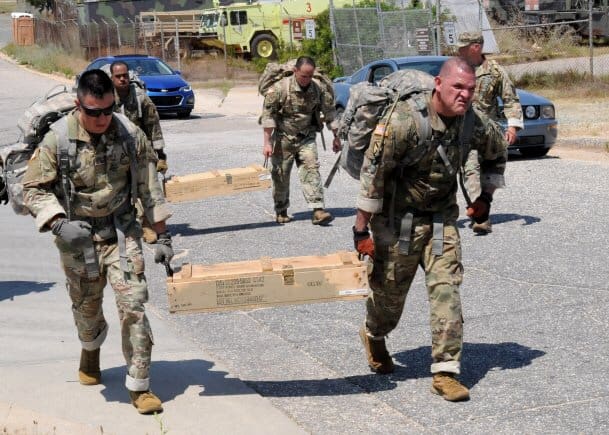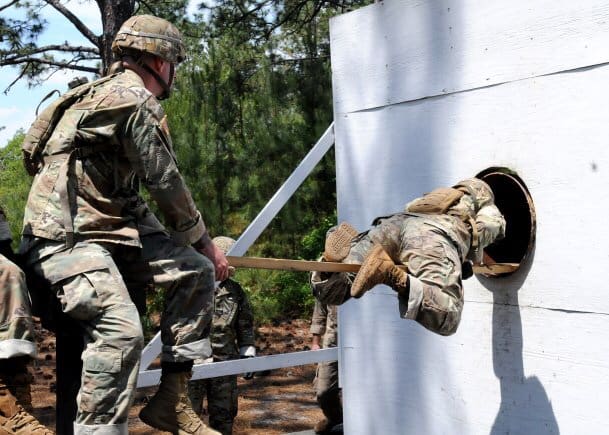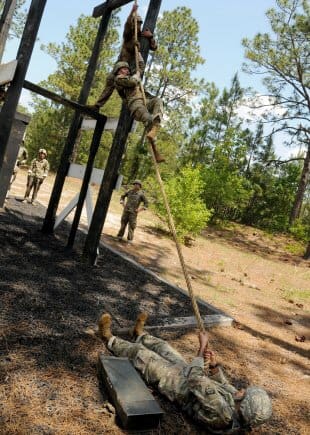FORT BRAGG, N.C. — Soldiers who believe they have what it takes to join one of the six Security Force Assistance Brigades (SFABs) must first pass the 3-day Security Force Assistance Command Assessment and Selection Course that’s designed to ensure they meet the standards of a SFAB Advisor.
Assessment and Selection Course candidates undergo a process designed to test their mental, physical and teamwork skills to ensure they possess the attributes that the SFAB teams are looking for in an Advisor.

Some of these attributes include discipline, sound judgment, moral conduct, and the ability to remain calm and collected while seizing the initiative during mission uncertainty.
“What we are looking for is someone who is physically fit, works well in a team, who is intelligent, and comfortable making decisions while operating with a certain level of ambiguity,” said Sgt. Maj. Robert George, SFAC Assessment and Selection Sergeant Major.
The assessment process is something new candidates are curious about once they decide to join the SFABs.
“I heard about the SFABs while I was deployed in Afghanistan and when I came back some senior NCOs I worked with had joined and let us know more about them,” said Sgt. Skyler Lewis, SFAC Assessment Candidate and Signal Support Systems Specialist from 1st Battalion, 41st Infantry Regiment, 2nd Infantry Brigade Combat Team, 4th Infantry Division. “I looked more into it and then decided that, yes, this is for me.”
The assessment process starts with in-processing on day zero and then moves onto day one. Day one starts the non-stop process that lasts through day two. It begins with the candidates conducting an APFT, team events, a leader reaction course, a warrior skills test, MOS proficiency and ethical dilemma tests, peer evaluations, a subject matter expert interview, and culminates with a challenging foot march.
“They briefed us on what it was going to be like when we got here and it was a little different than I thought it would be and a lot harder – but it was worth it – I thought it was a good process and I had to stay focused and push hard through some of the events,” said Lewis.

The final portion of the assessment process is the selection board on day three, after which, the candidates find out how they did and if they were selected. If selected, they receive information about the reporting process and continue their SFAB Advisor training there.
The opportunity to continue to training, mentoring and advising others is one of the reasons Fort Benning Drill Sergeant Joshua Tobin felt he needed to go through the assessment course and become a SFAB Advisor.
“I have been training and mentoring Soldiers for the past 12 years and really getting more into it with the new privates at Fort Benning for the last 33 months. I feel that this opportunity is the same, but bigger, you are still training, mentoring, and advising, but this time it’s with our partners,” said Staff Sgt. Joshua Tobin, SFAC Assessment Candidate with 2nd Squadron, 15th Cavalry Regiment, 194th Armored Brigade.
The assessment and selection process is still relatively new and constantly adapts to the current needs of the SFABs and will continue to change and facilitate any of their future needs.

“How we assess the Soldiers has changed since I got here almost a year ago. We have changed and added events that better identify the attributes that make a good Military Advisor,” said George. “We will continue to change things to better identify candidates who will make the best military Advisors.”
The SFAB Recruiting and Retention Team continues to look for Soldiers who are interested in becoming SFAB Advisors in one of the five active-duty and one Army National Guard SFABs. For more information and details about joining, visit the SFAB Recruiting and Retention Team website at www.goarmy.com/sfab or contact them at one of the following: Officers (910) 570-5159 and Enlisted (910) 570-9975/5131 or email them at usarmy.bragg.forscom.mbx.g1-ag-sfab@mail.mil.
By SFC Mark Albright, Security Force Assistance Command


The SFABs are actually a good idea. It keeps Army SF and other SOF units focused on training up host nation SOF units where SFABs can focus on host nation conventional units.
Army SF wasn’t designed to train solely foreign SOF and to dedicate them to only doing that would be foolish.
Army SF are trained to create unconventional force multipliers in active conflicts (at least that’s there traditional brief). SFAB is a brilliant idea, especially with the small political will to do classic foreign interventions that need congressional approval (ie with conventional soldiers). This gives conventional soldiers an avenue to contribute to the destabilizing forces around the world.
There’s a whole stick about them getting rolled out wrong (SOF like beret etc) but the idea has not had any serious detractors. SOCOM is very pleased, it lowers their exhaustion level that’s been a problem for years.
Sneaky,
To piggyback off of what Cameron said. While FID is a specified SF task, FID has never been exclusive to SF. Moreover, SF skill sets are tailored to support the UW mission, i.e. training counterparts in appropriate small unit tactics. That can be guerrillas, or Host Nation (HN) paramilitaries and conventional infantry, or more advanced small unit skills to HN SOF.
SF has not ever been a good option for other HN conventional units or beyond the HN infantry battalion level. In other words, if the HN needs training for their tankers or artillerymen or Brigade level HQs then an American tanker or artilleryman or experienced staff Officer / NCO – with adviser training – is a much better choice.
That was true in Vietnam with US conventional advisers to the ARVN and it is still true today. The SFAB initiative simply dedicates select conventional NCOs and Officers to the mission rather than it being done in some ad hoc fashion. It should work just fine.
TLB
I don’t disagree with SFAB for artillery, armor and engineer units.
Training HN conventional infantry provides SF the ability to train a basic level force, in basic tasks which helps with being prepared for training a guerilla force. SF training SOF doesn’t always provide that ability. Nor do teams always get time to drill down the basic skills back in the rear
Sneaky,
Fair point. I don’t think SF is going to be put entirely out of those kinds of infantry engagements because of the SFABs. There have always been more pressing jobs in the world than assets available. SFABs just take some of the pressure off and cover those other bases outside the SF areas of expertise.
TLB
I don’t think there will be any more. Milley are said he wants SF focused on training SOF units
Not entirely sure what you mean sneaky- SF aren’t infanteers, and are loathe to being used as such. SF training HND to basic level is like having schumacher take you for a road driving lesson
SF have been training regular infantry for decades, it’s nothing new and where do you get the idea that they loath it?
SF training soldiers at the basic level provides them a venue to stay proficient as basic skills which is whats needed in a UW environment.
SF is stretched thin the SFABs help relieve the pressure on SF Cameron and Terry explained it better than I could. People who think the SFABs are a bad idea couldn’t be more wrong.
*contribute against
Y’know… I can think of a lot of things I’d want to prioritize on for selection before we started worrying about things like they’re highlighting here.
First off, can the candidate work effectively with people outside his own culture? Is he able to develop rapport with them easily, and can he separate his own cultural baggage from what is necessary to work with them effectively?
Not everyone is capable of building that rapport and relationship with people outside their own cultures, and even those that can aren’t always the best people to have doing this because they sometimes identify too closely with the people they’re supposed to be advising and training.
There’s a bunch of stuff that goes into this beyond just the usual APFT and obstacle course sort of thing–Old boss of mine spent many years training the Saudi Arabian National Guard, and it was always interesting to get him talking about that experience, and just how badly it was possible to screw that up. He wound up doing a double tour over there because the carefully-selected replacement they sent over for him didn’t even last his first week before the Saudis were throwing him out of the country for behaving like a jackass.
This ain’t your typical hoo-aher than thou job.
Kirk,
I would combine your first two points and recommend selecting candidates that demonstrate the capacity to establish “effective relationships” rapidly. As you point out, lots of people are gregarious enough to get along socially with people of other cultures – at least for short periods of time – but have zero ability to get training / work done cross-culturally.
To be fair, it is a skill that takes practice. An entry level SFAB adviser, just like a new 18 series guy, will still need some downrange experience and mentoring to get reasonably good at it. I understand that aspect of advisory work is covered in some detail during the SFAB “Adviser Academy” or whatever the official name is of the qualification program.
TLB